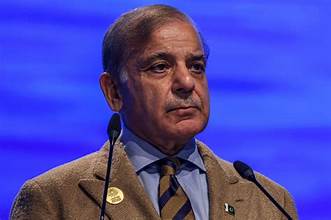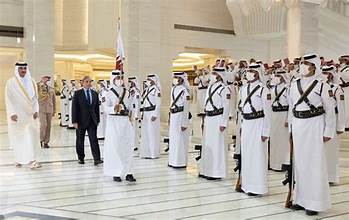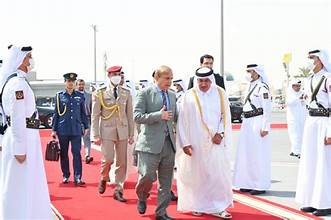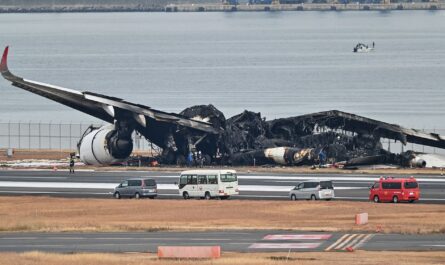In the aftermath of escalating violence in the Middle East, Pakistani Prime Minister Shehbaz Sharif has arrived in Qatar on a crucial solidarity visit. His trip comes at a time when Israeli airstrikes have intensified, drawing widespread condemnation from the international community and amplifying calls for peace in the region. This visit underscores Pakistan’s longstanding stance in support of Palestinian rights and highlights Islamabad’s efforts to engage with regional partners in finding a collective response to the crisis.
Context of the Visit
The recent Israeli airstrikes in Gaza and other Palestinian territories have caused a tragic loss of civilian lives and destruction of vital infrastructure. The violence has rekindled global debates around human rights, international law, and the responsibility of world powers to intervene diplomatically.
Against this backdrop, Prime Minister Shehbaz Sharif’s visit to Qatar is both symbolic and strategic. Qatar has historically played a significant role as a mediator in Middle Eastern conflicts, particularly concerning Palestine. By traveling to Doha, PM Shehbaz aims to demonstrate Pakistan’s unwavering solidarity with the Palestinian people and engage in high-level consultations on possible ways to reduce tensions.
Pakistan’s Position on Palestine
Pakistan’s stance on Palestine has been consistent across decades and governments. From the early years of its independence, Pakistan has advocated for the establishment of a sovereign Palestinian state with pre-1967 borders and Jerusalem as its capital. Islamabad has repeatedly condemned Israeli actions in Gaza and the West Bank, labeling them as violations of international law and human rights.
This latest visit reiterates Pakistan’s position. It signals to the international community that Islamabad remains committed to supporting Palestinians diplomatically, morally, and politically. By coordinating with Qatar, Pakistan seeks to strengthen collective regional voices in forums like the Organization of Islamic Cooperation (OIC) and the United Nations.
The Role of Qatar
Qatar has been at the center of Middle Eastern diplomacy for decades, especially regarding the Palestinian issue. Its financial assistance, humanitarian aid, and mediation efforts between Hamas, Israel, and other stakeholders have made Doha an indispensable player in the peace process.
For Pakistan, engaging with Qatar is essential. Both countries share cordial bilateral relations, bolstered by trade, energy cooperation, and labor migration. Qatar hosts a significant Pakistani expatriate community, further strengthening people-to-people ties. By aligning with Qatar diplomatically, Pakistan hopes to amplify its voice in pressing for a ceasefire and a sustainable peace framework in Gaza.

Diplomatic Objectives of the Visit
PM Shehbaz’s visit serves several objectives:
- Expressing Solidarity – To reaffirm Pakistan’s unwavering support for Palestinians suffering under Israeli aggression.
- Strengthening Coordination – To consult with Qatar’s leadership on potential diplomatic initiatives at the OIC, Arab League, and UN platforms.
- Mobilizing Humanitarian Aid – To discuss ways to pool resources for immediate relief to Palestinian civilians.
- Reinforcing Bilateral Ties – To deepen Pakistan-Qatar cooperation on regional security and economic fronts.
This multi-pronged agenda ensures that the visit is not merely symbolic but aimed at yielding tangible outcomes.
PM Shehbaz Reaches Qatar on Solidarity Visit Following Israeli Airstrikes
Regional Repercussions
The Middle East remains one of the most volatile regions in the world. Any escalation between Israel and Palestinian factions reverberates across neighboring states. Countries like Qatar, Turkey, Egypt, and Jordan are directly or indirectly affected by the fallout, whether in terms of security, refugee influx, or diplomatic challenges.
For Pakistan, which lies outside the immediate geographic zone but is deeply tied through religious, historical, and humanitarian bonds, the repercussions are significant. Pakistan’s voice in solidarity with Palestine not only strengthens regional diplomacy but also resonates with its domestic population, which overwhelmingly supports the Palestinian cause.
International Dimensions
The Israeli airstrikes have reignited discussions at the UN Security Council, European Union, and among global powers such as the United States, Russia, and China. While major powers remain divided on how to handle the conflict, countries like Pakistan and Qatar emphasize humanitarian dimensions and the need for a just resolution.
PM Shehbaz’s visit also signals to the wider world that Muslim-majority nations are willing to collaborate in pushing back against unilateral aggression. It aligns with growing demands for accountability in international law and the protection of civilian populations in conflict zones.

Pakistan’s Humanitarian Commitment
Beyond diplomacy, Pakistan has often extended humanitarian assistance to Palestinians. From sending relief goods to contributing to UNRWA initiatives, Islamabad has taken practical steps to alleviate Palestinian suffering. During his Qatar visit, PM Shehbaz is expected to discuss mechanisms for scaling up aid delivery. Coordinated humanitarian strategies, particularly through Qatari channels, could ensure faster and more effective relief for victims of airstrikes.
Challenges Ahead
While solidarity visits and diplomatic consultations are important, they face several challenges:
- Global Divisions: The lack of consensus among world powers makes achieving lasting peace difficult.
- Israeli Policy: Tel Aviv’s insistence on security justifications for its actions often sidelines calls for ceasefire.
- Fragmentation within Palestine: Internal political rifts between Hamas, Fatah, and other groups complicate mediation.
- Regional Tensions: Ongoing rivalries among Middle Eastern countries sometimes hinder unified positions.
Despite these challenges, visits like PM Shehbaz’s play a role in keeping the Palestinian issue alive in international discourse.
Conclusion
Prime Minister Shehbaz Sharif’s visit to Qatar following Israeli airstrikes underscores Pakistan’s firm commitment to supporting Palestine while leveraging diplomatic ties with influential regional players. This solidarity mission carries both symbolic weight and strategic value, as it strengthens the call for justice, humanitarian relief, and a long-term resolution to the conflict.
By standing with Qatar and engaging with broader regional stakeholders, Pakistan reinforces the idea that the Palestinian cause remains central to Muslim solidarity and global human rights advocacy. While challenges persist, such diplomatic efforts are vital in ensuring that the voices of the oppressed are not drowned out by the sound of violence.



